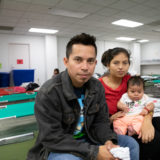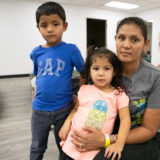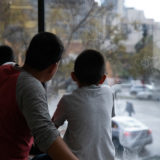NORMA CHÁVEZ-PETERSON
2019 CRISIS AWARD
San Diego Rapid Response Network
In February 2017, a number of San Diego’s civil and human rights, labor, faith-based and social service organizations, attorneys, health care providers and others came together to forge an extraordinary partnership. Their intent was to build a collaborative network to support immigrants affected by family separation, detention and deportation.
The initiative was galvanized by Norma Chávez-Peterson, executive director of the ACLU of San Diego & Imperial Counties and leaders from the San Diego Organizing Project, Jewish Family Service of San Diego, Employee Rights Center and Casa Cornelia Law Center. Their shared vision was to convene immigrants’ rights advocates and influencers from across the county, leverage their unique capabilities, and collectively provide meaningful assistance to vulnerable immigrants, migrants and refugees.
After 10 months of planning, organizing and hard work, the San Diego Rapid Response Network (SDRRN) officially launched in December 2017. It became a coalition of more than 40 organizations and dozens of volunteers working cooperatively to provide emergency assistance, connect affected individuals and families with valuable resources, and advocate for their safety and human rights.
The coalition succeeded beyond all imagination, launching an initial 24-hour hotline and emergency service referral program within their first year. By October 2018, the hotline had received more than 1,500 calls. On October 26, 2018, a caller reported observing several migrant families being dropped off in the middle of the night at a San Diego bus station. The following day, another sighting was reported, and in subsequent days, SDRRN volunteers logged reports of similar drop offs at various public transit hubs, leaving asylum-seeking families stranded.
Arriving to the community primarily from Central America, with some as far away as Africa and Vietnam, these families are fleeing terrible violence and persecution in their homelands. They have traveled hundreds, if not thousands, of miles to exercise their legal, human right to seek asylum in the United States. After being processed at the border by the Department of Homeland Security and given hearing dates to pursue their asylum claims in immigration court, they are legally granted the right to live in the country as they await their hearing date. But, for the vast majority of these families, San Diego County is not their final destination. More than 95% arrive with the hope of joining sponsors or relatives in other parts of the country, but they are offered no support or guidance to ensure they have travel plans and financial support to reach their final destination—assistance that was previously provided by immigration officials. This left hundreds of families and children stranded and homeless.
SDRRN’s experience in building and implementing a rapidly deployable infrastructure prepared the coalition to respond immediately with critical humanitarian assistance to this newfound crisis. Member organizations pooled their resources, securing space and setting up an emergency shelter within one day of the initial hotline call.
By the end of 2018, SDRRN’s unparalleled infrastructure allowed them to pivot to a critical new role as California’s de facto first responder for the humanitarian needs of thousands of asylum-seeking migrant families transitioning through San Diego to other U.S. destinations.
Although its location has changed a few times, the SDRRN shelter is routinely filled to capacity, providing children and families with a safe place to rest, food, clean clothes and shoes, medical screenings, travel arrangements and other resources. Families stay an average of 24 to 48 hours. As quickly as one group moves on, other families are dropped off by immigration authorities—at the rate of 50 to 60 families a day—without food, shelter or the means to complete their journey.
Since the initial call, SDRRN has sheltered and cared for more than 12,000 asylum-seeking migrants. They are all families—mostly women with young children. SDRRN’s civic and moral leadership, competence and determined advocacy has earned the coalition bipartisan political support.
From the beginning, SDRRN’s efforts were intended as a stopgap measure. However, with no other infrastructure in place in the California border region capable of meeting the significant humanitarian needs of asylum-seeking children and families, these efforts are essential to the safety and well-being of all Californians, including newcomers.
Granting asylum to people seeking protection and freedom exemplifies America’s long-standing national values: compassion, inclusion and justice and San Diego has a proud history of welcoming refugees from around the world. Because of the San Diego Rapid Response Network, whose motto is “no one stands alone in our communities,” the San Diego border region is a safer and more welcoming place for all children and families.
SDRRN CORE PARTNERS
ACLU San Diego and Imperial Counties
Jewish Family Service
SEIU Local 221
San Diego Organizing Project
SDRRN LEGAL PARTNERS
Immigration Justice Project
Casa Cornelia Law Center
Catholic Charities of San Diego
Jewish Family Service
Legal Aid Society of San Diego
SDRRN PARTICIPATING ORGANIZATIONS
2-1-1 San Diego
ABA Immigration Justice Project
American Civil Liberties Union of San Diego & Imperial Counties
ACCE
AFT – Immigration Committee City College
California Western Community Law Project
Casa Cornelia Law Center
Casa Familiar
Catholic Charities of San Diego
CSA San Diego County
Center of Community Solutions
Employee Rights Center (ERC)
Legal Aid Society of San Diego
MAAC Project
North County Immigration Task Force
Parent Institute for Quality Education (PIQE)
Price Philanthropies
San Diego City College
San Diego Unified School District
San Diego Organizing Project
SEIU Local 221
SEIU USWW – San Diego
South Bay Community Services
Vista Community Clinic



